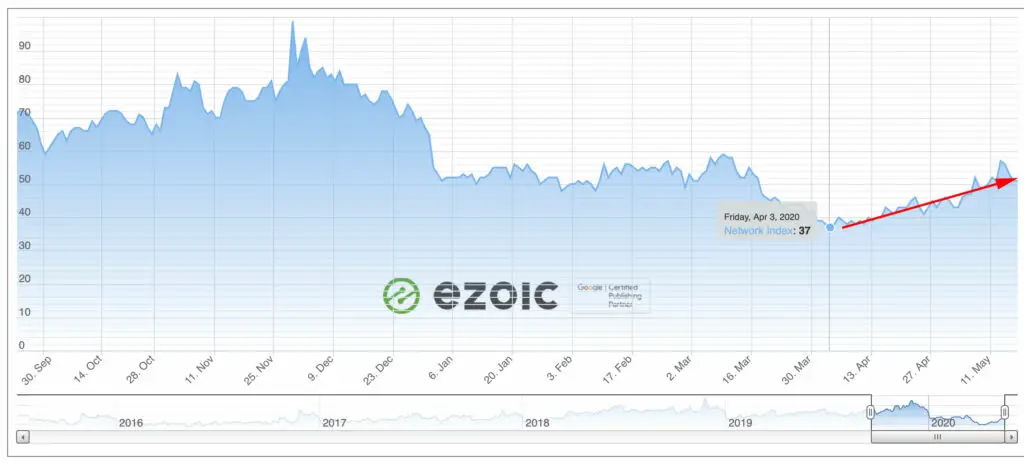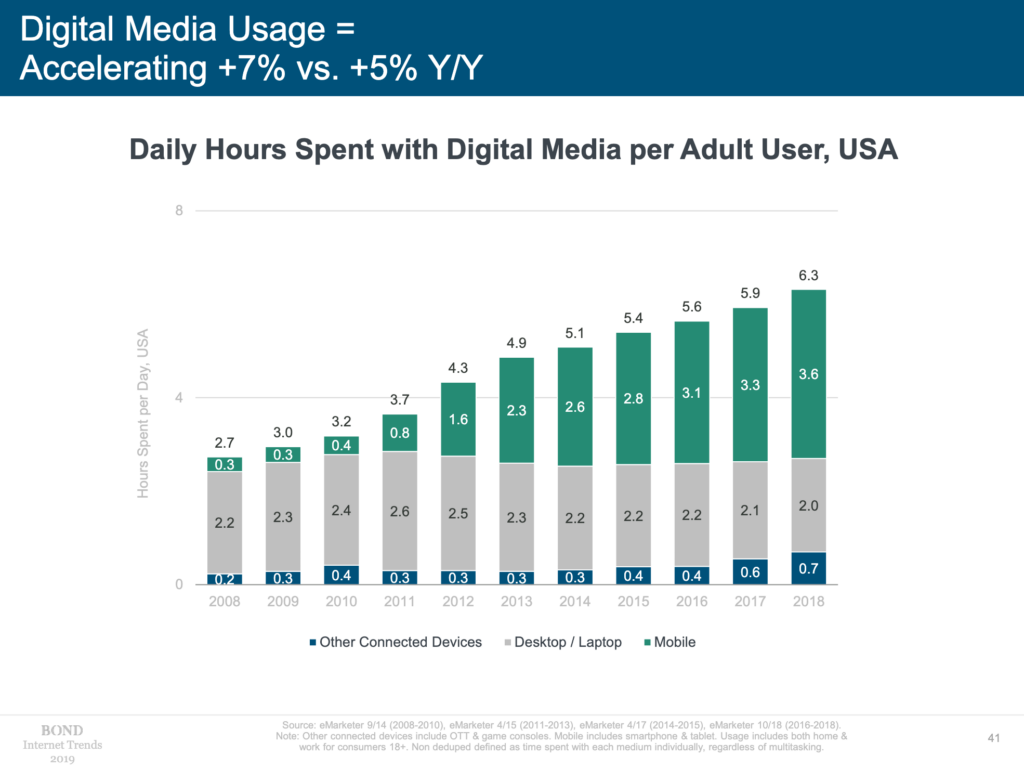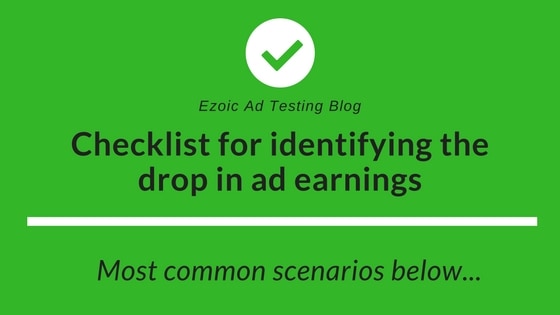If you’re reading this there is a good chance you’re in the first stage of trying to figure out why your ad earnings dropped. Whether the earnings are from Adsense—or any number of different ad networks, you’re not the first person to experience this issue.
Below, we will share with you the most common reasons why your site could have experienced ad earnings drops.
Updated on May 18, 2020.

Ad earnings drops could be caused by a variety of reasons…
Even with the common scenarios for why ad earnings drop, there is a lot of variability from site to site. There are notebooks full of strange one-off stories as to why ad earnings dropped for certain sites over the years. However, as a Google Adsense partner and as a testing platform provider to over +20,000 sites worldwide, there seem to be several common themes that can be easily identified as a reason why ad revenue could be in decline.
Consult the Ad Revenue Index first
Before reading through all the techniques you can use to combat a slump, you should first consult The Ad Revenue Index. This will tell you how the marketplace is doing overall. There might be a chance that everyone’s ad rates have dropped, not just you.

The reason ad earnings dropped recently: the Coronavirus
The Coronavirus caused the largest ad earnings drop since the 2016 low. An index score of 37 was recorded on April 3rd, 2020. While there are more factors that affect ad earnings outside of just ad rates, this historic drop hurt many long-time publishers that have had to since weather the storm.

Ad rates appear to be stabilizing, but they aren’t at the level they should be in Q2. As things improve with the pandemic, ad rates should continue to increase as well. Additionally, we wrote a blog on how the Coronavirus is affecting ad rates and website traffic that we update regularly.
The driving factor behind the ad earnings drop is supply and demand. When the pandemic began, advertisers across many industries cut their marketing budgets. This lead to a surplus of ad inventory (physical ad spaces on the page) but a shortage of demand (advertisers bidding on those spaces).
The publishers most affected by this were the ones who changed none of their ad setups. You need to restrict the available ad spaces on your website when there is lower demand present in the ecosystem (fewer, lower bids).
Publishers that use Ezoic’s Ad Tester avoid this phenomenon entirely. The machine learning that powers Ad Tester automatically optimizes the value of ad inventory when ad demand drops (or rises).
Additionally, if your ad earnings drop is only from AdSense ad units (even if you’re using Google Ad Manager or AdX), you could be affected by the Google Two-Click AdSense penalty.
Are ad earnings dropping because of seasonality?

Ad earning drops due to seasonality is the best-case scenario for publishers. If your ad earnings have dropped it’s possible that it is the result of the common ebb and flows throughout online advertising. While some sites are different from others, there is a common schedule for these fluctuations from our experience.
Consult the seasonality index and learn more about easily measuring yourself against seasonal trends here. Additionally, we wrote an article on why ad rates are usually lower at the beginning of the year.
You can see these fluctuations in the chart below to determine if this is a potential possibility as to why your site earnings have dropped. One of the best ways to do this is to examine your historical Google Analytics or Adsense/Ad Network data to see if these kinds of moves are consistent YoY. This method works best if you have a few years worth of relevant data reference points.
Your data will be far more telling than the general data below. But for a number of reasons, your historical data may not be like comparing apples to apples.

But, if you’ve made significant changes over the last year, then it’s possible you may be having trouble putting your finger on the exact root of the issue.
Verdict: Seasonality could ultimately be a single factor or a contributing factor in the decline of your overall ad earnings.
Could mobile SEO be causing your ad earnings drop?
Google and other major search engines have repeatedly shared that more and more web traffic is being initiated from mobile devices. This is a well-known fact and it is likely causing some degree of disturbance in your ad earnings.
Many publishers may know this already, but mobile ads and ad earnings are typically much less than what is experienced from traditional desktop site ads. The widespread prevalence of mobile usage has lessened the impact on ad rates. Even so, desktop ads still tend to receive higher CPMs.
If you experienced a steep and quick decline recently—mobile SEO is likely not the primary cause. Just like with seasonality, it could be contributing, but a telltale sign of mobile ad revenue drops is that they are typically not quick or dramatic.
A good way to answer this question is to pull a Google Analytics report that looks at a month now and a year ago (or two years ago). Have the report look at the devices people use to access the site. It will show you the YoY percentage change which should help you determine if this is the issue or not.
See the directions below…

To draw a report similar to the one above:
- Open Google Analytics
- Select a date range at the top (pick a month where things are consistent)
- In the date range selector at the top, check a box that says compare to: and select “previous year” from the drop-down and click “Apply”
- Now use the menu on the left to navigate to Audience > Mobile > Overview
- The graph should display the YoY percentage change which should help you consider how much of a factor mobile is in your ad earnings dropping.
Mobile usage is on the rise and should not be ignored
Regardless of if this is the ultimate culprit of your recent ad earnings drop, mitigating the risks of an increasingly mobile internet experience on your site is important to dig into.
Mary Meeker’s 2019 Internet Trends Report highlights this to a powerful degree.

Many publishers have made a living off of a largely desktop experience. This is how most publishers typically view their own site, so it is the experience they are most familiar with. For this reason, publishers will often lose touch with just how different a mobile experience can be from a desktop experience.
The best way to ensure you don’t fall behind in this area is to test and evaluate your experiences on mobile. Here are some resources on how to deliver a good mobile experience to your visitors:
- Mobile Website Optimization Errors That Cost Publishers Traffic & Money
- 3 New Ways To Improve Google Mobile Results (Post-Mobile First Index)
- Adapting Your Mobile Publishing Strategy To Fit Your Audience
- What’s A Good Bounce Rate (Plus Other Engagement Metrics) In 2020?
- Google Mobile Friendly?
What if ad earnings drops are caused by site traffic or page experiences?
Unfortunately, these causes are the most difficult to fully pin down. However, the are a number of common indicators that will allow you to quickly distinguish between some of the most common scenarios in which we see ad earnings dropping.
There’s a steep decline in traffic
A massive drop in traffic a lot of times has to do with a misplaced tracking code.
The tracking code on this particular website below disappeared off the front page and caused a massive drop in traffic. However, this cannot account for the loss in ad earnings. This is always important to check if traffic falls off of a cliff but ad revenue isn’t as dramatic.

Steep decline in revenue but not traffic
If site traffic is doing okay, but ad earnings are declining steeply, it might be a good time to look closely at the ads running on your site. It’s possible that one or more of the ads on your site are causing a bad user experience or causing them to bounce completely from certain pages.
For example: It may be something like an autoplay video above the fold or an ad that cannot be closed properly inside of a mobile viewport. Both of these types of issues could cause large impacts on ad earnings; especially if they are on a high traffic page. Here’s a simple way to check this using Google Analytics.

1. Log in to Google Analytics and find the property that you’d like to look into and select a date range that includes the full width of your ad earnings dip.
2. Using the left-hand menu, navigate to Behavior > Site Content > All Pages
3. Under the Explorer tab, select Bounce Rate from the drop down menu. This will allow you to see any collective variations in bounce rate that have occurred during the time period you selected. If there is a big shift, drill down to determine which pages may be affected the most.
4. Identify pages with a high bounce rate and click those URL’s.
5. One the drill down pages of each URL, under the Explorer tab, select Bounce Rate from the drop down menu.
6. This should allow you to drill into your pages with the highest bounce rate to determine when the bounce rate increased (if it did at all).
This is one of the best ways to quickly identify if there is something on your pages or site that is directly affecting users causing them to bounce.
Are ad earnings dropping due to poor ad positions?
If ad revenue is dropping, traffic is stable, and you can rule out one of the other above issues—it could be your ad positions. Few people actually realize the dramatic impact that ad position has on their earnings. Many ill-formatted ads with poor viewability metrics might be damaging user experience. These are the most common reasons why earnings drop, yet traffic stays the same.
The only way to determine if this is the case is to test different ad positions manually. Most publishers hate this process because testing is difficult and takes lots of time.
Publishers use Ezoic to test thousands of ad configurations to determine optimal distribution. This allows publishers to not only stop the decline in earnings but the ability to increase UX and revenue at the same time.
A sharp decline in both revenue and traffic
If you’ve experienced a quick drop off in traffic and ad revenue, it’s time to work backward. Rarely do these kinds of things happen quickly without any cause that can’t be quickly identified.
Recent changes like launching a new website, changing hosts, or implementing a new CMS are likely culprit #1. A lot of times these will cause redirects, indexing, or crawl errors. If you launch a new site and do not set a canonical URL or redirect for the different variations of your URL (i.e. www.yoursite.com vs. yoursite.com) these things could be configured to cause a redirect loop or 404 error that may cause a lot of harm to your website.
Additionally, if your URLs have recently changed due to a new site launch—or another reason—it’s important to look closely at your redirect spreadsheet. If you do not pass on your previous link history to the new ones, Google and other engines will see it as a completely new page.
Also, new CMS systems or site configurations may have accidentally non-indexed your important pages. This is an easy fix. In WordPress, there is usually a function down at the bottom of each page that will let you check this.
Important: If your pages are set to non-index they will not be crawled by search engines.
Steady declines in organic traffic and ad earnings
A steady decline in both ad earnings and traffic over the course of weeks or months may indicate a more systemic issue worth closely considering. You may be losing organic traffic positions. Here’s how to quickly identify this.
Option 1: Pull a Google Analytics report that looks at overall traffic and organic traffic side-by-side. Pull session data over the time span you’re considering and select segments “all users” and “organic traffic” at the top beneath the Explorer tab.

Option 2: Use a tool like Moz or SEMrush to identify changes in keyword rankings and organic performance.

If you do experience drops in traffic and earnings, It’s important to focus on the basics; good quality content and strong on-page user experiences. It’s important to realize that these organic factors could be influenced by some of the other traffic issues above too.
A bad redirect, a mobile ad that won’t close, etc., could be affecting things like bounce rate and time on site in a way that is negatively impacting SEO as much as it is revenue. These factors can prove to be a huge hit for your bottom line if not addressed quickly.
The Impact of Page Speed
It’s also possible that page speed could be affecting bounce rates, general SEO, and other elements of page experience for your site. Again, this could be related to certain types of ads, new javascript on your page, or something else. The easiest way to test this is to run it quickly through a set of tools.
Two good tools to see what might be slowing your site down are PageSpeed Insights and Pingdom.
We engineered the Site Speed Accelerator to give publishers a solution to their page speed issues. It improves PageSpeed Insights scores and perceivably increases speed for users as well.
Wrapping it all up
There are countless variables that affect your ad earnings, both positively and negatively. There are natural fluctuations in earnings, and publishers tend to overreact to small day to day changes. However, it is important to get ahead of steep declines before the issue becomes worse.
If you are experiencing trouble with your traffic and ad revenue, reach out to the Ezoic team today. We’re a certified Google partner and our system helps publishers optimize user experiences and ad revenue every day.
Do you have any questions on how to diagnose drops in ad earnings? Let me know in the comments.


